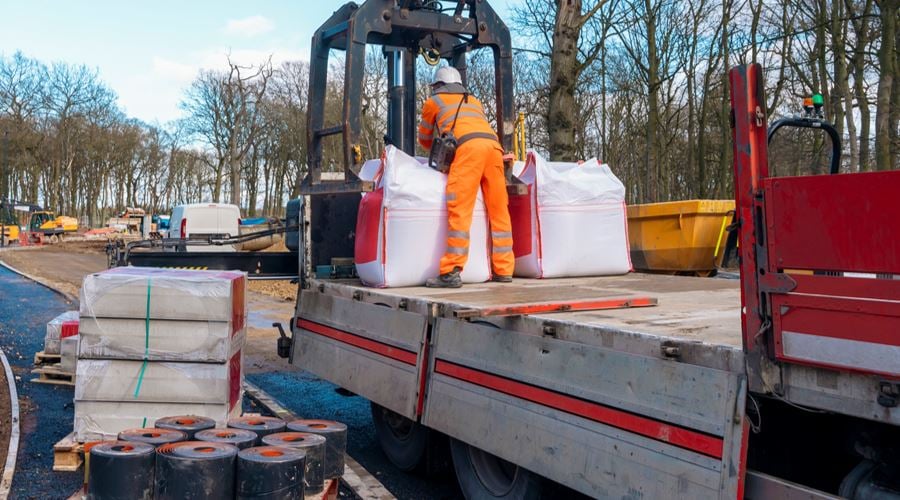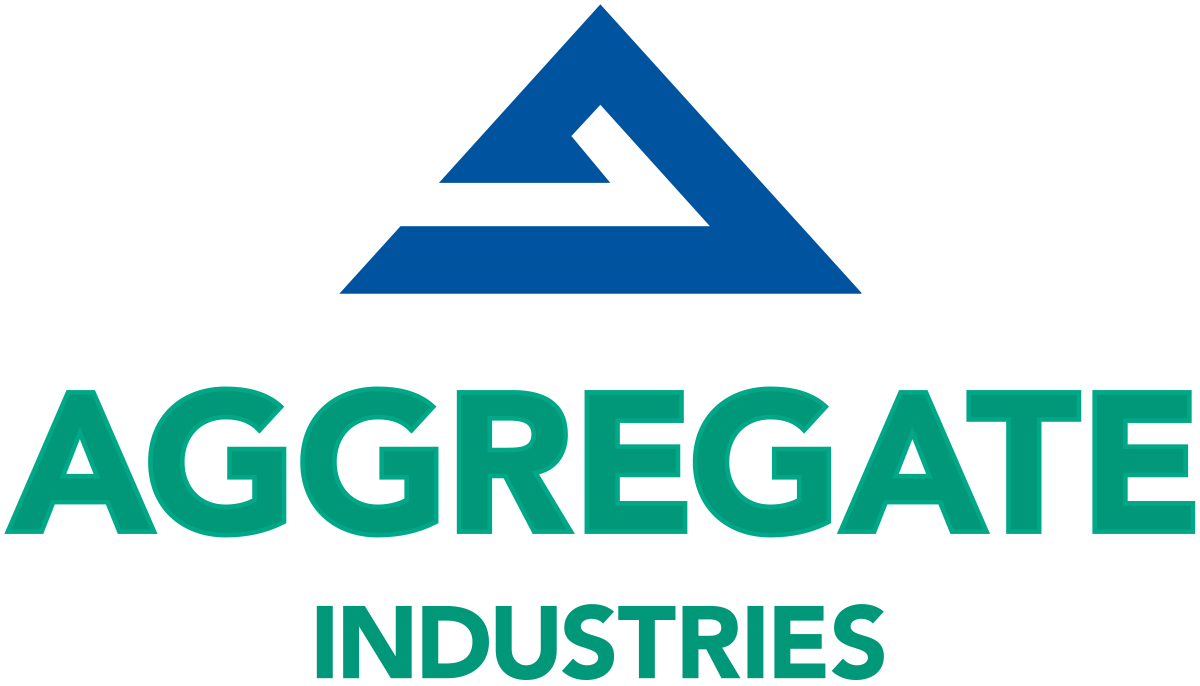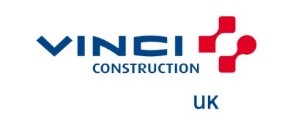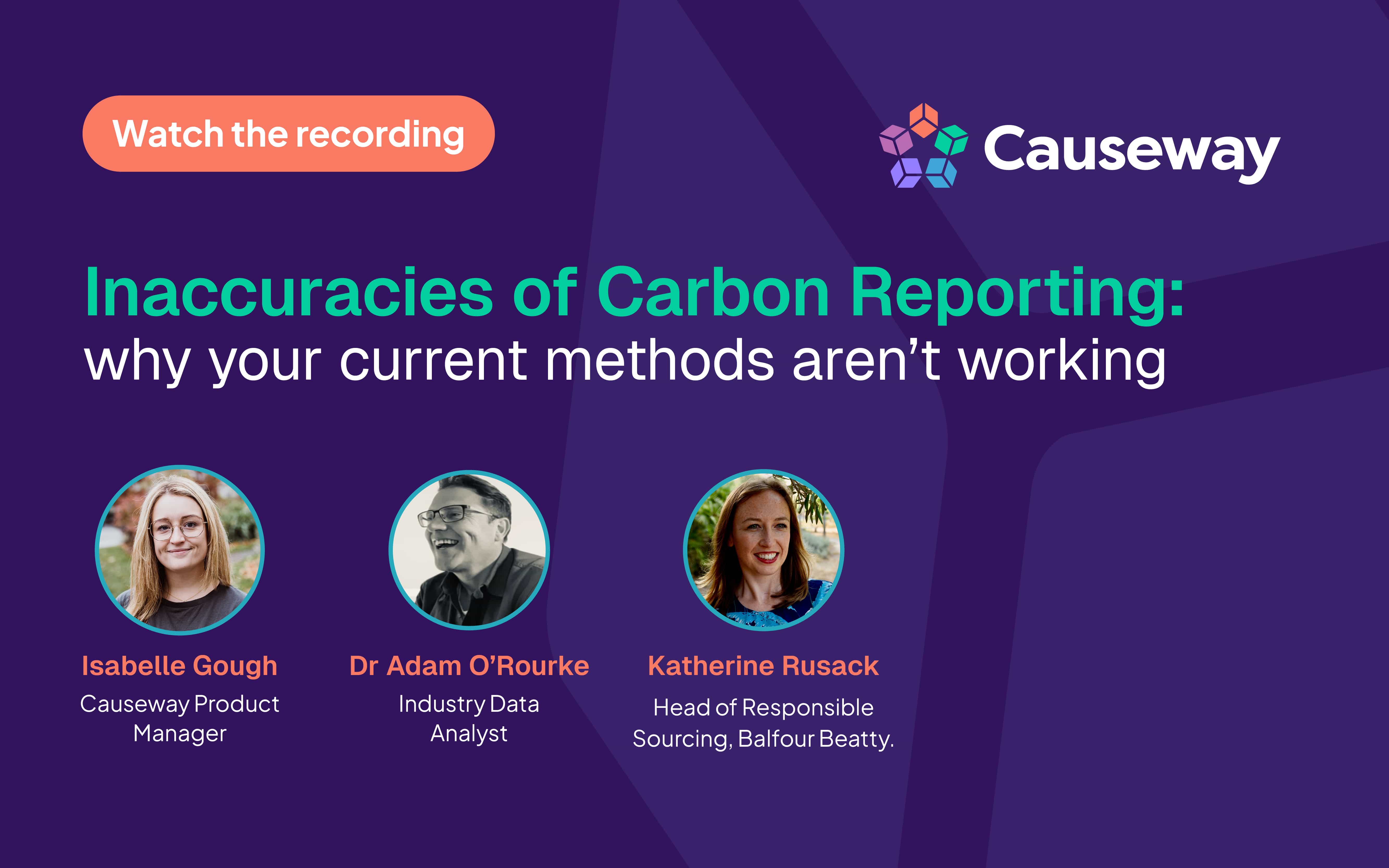-min.jpg)
Let's talk carbon: turning construction's biggest challenge into a clear opportunity
Discover how the construction industry can tackle its carbon emissions challenges and seize sustainability opportunities. Learn ...
The accuracy of the data used to support Scope 3 emission reports is increasingly seen as the biggest challenge to reducing the construction industry’s carbon footprint on the road to net zero.

The Scope 3 Initiative is a collaborative venture between Causeway, Aggregate Industries, Balfour Beatty, Galliford Try, Kier Group Ltd, Morgan Sindall and Vinci Construction UK, supported via a partnership engagement with the Engineering Department at the University of Bath.




/Images/Morgan_Sindall_Logo.svg)


The initiative is working to develop a software solution - CausewayOne Carbon - that can deliver a credible, verifiable, efficient and scalable way to provide embodied carbon data in real-time, using invoice data automatically extracted from Causeway Tradex, the largest connected construction supply chain community in the UK.
Through leveraging existing invoice data automatically extracted from Causeway Tradex - the largest connected construction supply chain community in the UK - and pairing it with the latest Embodied Carbon Factor data, CausewayOne Carbon reports embodied carbon values. It provides suppliers and contractors with their “paid for” embodied carbon values and supports a wide range of carbon accounting methods. It supports GHG reporting including Scope 3, and a number of other relevant frameworks.
This short guide provides all you need to know on how to measure embodied carbon emissions to meet your Scope 3 obligations.

Scope 3 carbon reporting involves tracking indirect emissions from a company's value chain, including those linked to purchased goods, services, and other operational activities. It's crucial because these emissions often constitute a significant portion of a company's carbon footprint. Accurate Scope 3 reporting enables companies in the construction sector to identify and reduce their environmental impact more effectively, aligning with global sustainability goals and regulatory requirements for carbon reduction. This initiative provides a systematic approach to measure, manage, and minimise these emissions.
CausewayOne Carbon is designed to seamlessly integrate with existing procurement and invoicing systems, leveraging the financial transactions already present in those systems. This integration facilitates the automatic calculation of embodied carbon values for each transaction, streamlining the process for companies and ensuring that carbon reporting becomes a natural part of the procurement workflow without requiring significant additional efforts or changes to existing operations.
Both contractors and suppliers can expect to accurately track and reduce their carbon footprint, enhancing sustainability. CausewayOne Carbon offers real-time, product-specific embodied carbon data, improving procurement decisions. Suppliers gain a competitive edge by showcasing lower carbon products. The product also supports compliance with environmental regulations and aligns with global sustainability goals.
CausewayOne Carbon ensures accuracy and reliability of carbon data through a robust framework that ties embodied carbon information directly to invoicing data, reflecting actual materials and products used. This approach allows for precise tracking of embodied carbon, supported by a transparent and verifiable system. It contrasts with traditional methods that rely on generic or estimated data, offering a more dependable foundation for making informed decisions related to carbon management and reduction in the construction industry.
Yes, the platform is designed with user-friendliness in mind, ensuring companies of all technical capabilities can easily adopt and benefit from CausewayOne Carbon. It focuses on integrating with existing systems to minimise the learning curve and streamline the adoption process, making it accessible for businesses to start improving their embodied carbon reporting and management practices without the need for extensive technical knowledge or resources.
The initiative contributes significantly towards net-zero targets by facilitating accurate Scope 3 emissions tracking and reduction in the construction sector. It encourages a collaborative approach to developing standardised, industry-specific reporting solutions, enabling the construction industry to align with global sustainability objectives and meet environmental regulations effectively.
Joining the Scope 3 Initiative may involve certain costs, aimed at covering the development, support, and maintenance of the carbon reporting tools and platform. These costs can vary based on the scale of implementation and the level of customisation required for integration with existing systems. Prospective participants are encouraged to inquire directly for detailed pricing information and any available funding or support options to facilitate participation.
Companies interested in finding out more about this initiative can start by joining the waitlist via the form below. In the near future we’ll be sending out detailed information on the initiative, including how to get involved, the benefits, and any requirements for participation.
-min.jpg)
Discover how the construction industry can tackle its carbon emissions challenges and seize sustainability opportunities. Learn ...

Learn why spend-based carbon reporting is flawed and how data-driven methods can transform your construction project's ...

Overcoming fragmented data and inconsistent methodologies to achieve accurate project-level carbon reporting in construction.

Digital invoicing ensures accurate carbon reporting by automating data capture, integrating with carbon databases, and ...

Discover why traditional carbon reporting methods fail and learn how CausewayOne Carbon offers accurate, invoice-based data for ...

In the ever-evolving journey toward a sustainable construction industry, our recent Carbon Community event was a significant ...
Get in touch to discuss how CausewayOne Carbon can help you accurately measure and report your true embodied carbon impact.
Accurate, unified carbon footprint calculations based on transactional data.
Simplified compliance with global and local regulations.
Eco-friendly material selection for sustainable projects.